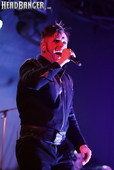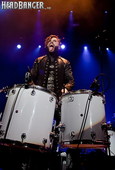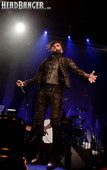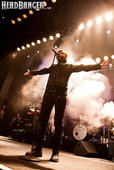Oomph!
This Job Has So Many Different Sides
09.12.2017
Архив интервью | Русская версияGerman industrial metallers Oomph! have never allowed themselves to sit still - I guess that's one of the secrets of their huge success. Just this spring the band, which was founded more than a quarter of the century ago, rocked Russia with a regular tour, and its frontman Dero Goi is already gearing up to come back. However, this time it will not be a regular live show, but a DJ-set which he will perform in St. Petersburg in Moscow in mid-December. We reached out to the controversial singer right after Oomph!'s German shows to discuss this rather unusual format of performing, future plans, music and life in general.
I would like to start with the following question: I know that you spoke on many occasions, at gigs and in interviews, about how important the live sound is to you, and you were also quite negative about some musicians using pre-recorded material during live shows. I perfectly understand this point of view, but where does the electronic music stand for you if you take such perspective? And what do you think about DJ-ing in this respect?
Well of course DJ-ing has nothing to do with a rock band, with a band playing live on stage. So when I am DJ-ing I am entertaining the crowd with music that I like to listen to when I am at home or with the music of my teenage time – whatever, my all-time favorite music. This is a different kind of entertainment. Of course there are DJs who like to use dubs and try to give the whole thing their own handwriting or their own trademark, but that’s more in the house or techno scene. When I am DJ-ing I am just trying to show the audience what I personally like and hopefully kick people’s asses with my kind of music – which has nothing to do with Oomph! of course. And speaking of electronic bands, when they are on stage, nowadays it’s possible to use equipment like Ableton for example, so you can play it almost live. This is just my way of thinking of course, I know there are so many bands and artists who do kind of karaoke - you know, where everything comes from tape and they are just lip-synching. This is not my approach to music: when I am on stage I want to have it completely live, because that’s the ultimate package of emotions. I don’t condemn people – if they want to go and listen to a concert where almost everything comes from tape, then it is their choice, but to be honest, I would like to have it announced on the poster – like, “it’s almost live” or, I don’t know, whatever, “50% live”, “karaoke”. Because I bet that there are many people, for example, who go to listen to Neue Deutsche Härte bands and they don’t even know that half of the music is coming from tapes. So that’s the difference. With Oomph! everything is live.
Okay, I see. Coming back to DJ-ing, do you perceive it as just a hobby then, not a serious occupation?
Yes, that’s just a hobby for me. I am not a professional DJ, I would not consider myself that. But people like to see what I do as a DJ, which music I like, and it’s cool. For me it’s a completely different world, so it is a good alternative to what I usually do on stage. And it’s also very much fun. But of course I prefer to be a singer in a rock band that plays live – it is much more fun than being a DJ, it is more unique.
When did you start DJ-ing?
I think about 15 years ago.
You are going to appear as a DJ in Moscow and St. Petersburg in December. Are you going to do different sets, because I remember you don’t like repetitions?
Well (laughs), of course there will be similarities because I still like some music that I played before as a DJ, but yeah, from time to time I complete the set with new stuff, so I try to vary it. But I cannot promise to have it 100% different than the last time.
Okay. It will just be your favorite music then.
Yeah, of course! It does not make sense if I would be a DJ and people just tell me what they wanna hear. That would not be my taste of music then.
Yeah that would have been strange, totally. Speaking of repetitions, how do you usually perceive tour life? Does it bore you when you have to do the same routine and the same set list of songs?
Well, it’s a double-edged sword. It’s got two sides of the coin as almost everything in the world. Of course, there are boring parts in the life of a musician, because you wait for so much time: you wait at the airport, at the entrance of a hotel, at the backstage, in the room for the gig or for a soundcheck. You wait for the dinner. You wait for so many things! And then there are these two hours of maximum energy on stage. And that’s the really cool part of being a rock musician: to be able to broadcast as much energy as possible on stage and to receive it back from the audience. You have this ultimate reaction on stage and it’s the best. And as I said, as we are playing 100% live we can react on the audience, we can play songs longer or shorter as we want to. And yeah, we can also vary a bit with the set-list. But usually we don’t do it because we work it out for a long time, like a rollercoaster, and it has to fit. I know where to put certain songs that are harder to sing than others. Of course my voice has to grow into the concert a bit, so the later the concert begins and the longer it runs, the later I can put songs which are harder to perform. It’s kinda like a warm-up, you know. You start with calmer songs, so that your voice could get used to the whole thing. Thus you don’t make it exhausting for you and make it as exciting as you are able to have it. And it’s also good to have kind of blocks with faster songs, then maybe one or two slower songs in-between to make it more versatile. So it is always hard for us to pick up the right songs. I could imagine that almost everybody who likes our music would say: “Hey, you can play 10 hours, play a-a-all your songs that you’ve ever written”! But that’s of course impossible…
Physically!
It’s impossible for the voice and logistically it is also not possible. But I could imagine for example to have an arena concert where everybody comes in instead of having a tour and then playing for hours – why not. On a tour you have to take care of your voice, there are so many things you have to care about. You never know even how the weather is! Sometimes when on tour in autumn or in winter you have to just go to the hotel, go out again, go to the busses and off to the airport straight away – and that’s it. Do you know what I mean?
Yeah, it is pretty easy to spoil everything just by walking out in winter.
There are viruses everywhere. It’s really-really hard for a singer. You know, if you catch a flu as a guitarist – no matter, you can play with a fever. But as a singer it means it’s over. So usually I am the first to be in the hotel room after the gig and I am the one who sleeps the longest – because I have to take care of my voice! And I am always drinking tea and having scarves on!
But if it is a one-off gig than you take less care. So does that mean that by the end of the tour you take less care of yourself too?
That’s it! Well when it’s the very last song, everything is like: so what. So fucking what!
What do you generally enjoy more: writing new material, recording it or playing it live?
The good thing about being musician is it is so versatile. Everything is fine, it’s all so different. Shooting music videos or doing interviews is also a part of it. This job has so many different sides, and it is good that way! It would be boring if I were just a studio musician or just be on stage all the time or only do interviews. (laughs) It is good to have it all. When you shoot videos it is kinda like a miniature version of a film industry, because you can be an actor for a short time – that’s cool too. And being on stage is a maximum of emotions – that’s great, I like that.
And what is going on with the new Oomph! album may I ask?
We’ve been busy over the last months and we are happy to say that we have almost finished with the pre-production of the album, so yeah, that’s cool. And then there are gonna be the recordings and the mixing. We are really happy that we did so many great songs until now – the musician is always in love with his current flame, you know – in our case that’s the new CD usually. So we are looking forward to release the new material. It’s really “back to the roots” in a way. But not without showing new aspects also. So it is kind of like a hybrid between the 90-s Oomph! and the actual Oomph!
This sounds very interesting! When can we expect that?
Next year. But not in the first half of it. But it is planned to be released next year. Because we wanna come back to Russia! (laughs) That’s our plan! Touring in Russia is the best thing for us – that’s the highest point, if you know what I mean! It’s cool: we know that we have true fans in Russia, they are so enthusiastic. Even for us as musicians it is always great to come there and to see that they are still so full of energy - that’s the coolest thing: you enter the stage and people freak out! You don’t have to kick your own asses on stage, you know, because they’ve already been kicked by the fans! So yeah we are really looking forward to present our next album next year in Russia.
So the next year we might expect some small tour over Russia as you’ve done this year as well?
Up until now each tour has grown, so hopefully the next tour will also grow a bit. If there are one or two gigs more each year or each two years it would be awesome. And there are still many-many cities in your beautiful country that we have not visited yet. So there is more to come hopefully.
Cool, that would be amazing! Have you ever considered taking the Trans-Siberian Railway?
Oh that would be an adventure of course! But I must tell you that I almost cannot sleep in a train, so I would try to avoid it. There were a couple of gigs when we have taken the night train from St Petersburg to Moscow or vice versa and that’s not good for me because I almost did not sleep at all. That’s too dangerous. I’d rather stay in the hotel and take the train from Moscow to St Petersburg over the day.
Yeah I understand. Plus, that would be a tough journey – it is quite long.
Yeah, I know! But it must be awesome to go to Lake Baikal. It must be amazing! I can imagine doing this in my spare time, privately. But not as a musician to be honest.
This makes total sense. How important are lyrics in your practice?
I think they are as important as the music. I really work hard on my lyrics and until the very last second of the production I try to find better words, the ultimate best for this or that sentence. That’s almost the same as with artists: as far as I know they are never satisfied. But it’s good that way. If you were satisfied too soon, then the result would not be good. It’s really important, that’s why I read a lot of literature – novels, lyricists, whatever. I also really like ancient stuff from other centuries. I am really inspired by these old brilliant artists like Goethe, Schiller, Brecht. There are so many German lyricists, especially at the expressionism for example, which really inspired me a lot. And that’s what I really feel. At the beginning of industrial times the really dark lyrics were written in Germany and in whole Europe. And we are a bit at the similar point – not in the industrial revolution of course, but we’ve got the digital revolution right now. And it will be as overwhelming for the whole world as the industrial revolution used to be. It’s a breaking point again. As I said there are always two sides of a coin, so it will bring many good things and many bad things.
The question is do we have the poets which they had in industrial era.
That depends maybe on the country and the system and the society. But I do believe that the society goes together more and more. It is easier now to react on certain developments. Because every country is connected to the other one, even though there are propaganda and censorship, but people can see what’s going on in the world if they really want to. I think that’s an advantage. And as a whole society we can react faster than it used to be 100 years ago.
I remember in quite a few of your recent interviews you talked about the notion of freedom and you addressed both artistic and political freedom. What does it mean to you, how do you understand it?
I think freedom of speech is a really high good. In my eyes it is much higher than, for example, religious freedom. I want to be allowed to criticize religion. And religious people have to bear that. I think if you are really true in your belief then no one can really hurt you by criticizing you. If you believe, than you really believe! And no one can lead you away from your belief with a joke or with a caricature or with a song. If you really believe it should not bother you, you can say: I believe, but you can criticize whatever you want. So I really don’t like the development of policy to take belief and minimize the freedom of society. They just take it as a tool and say: you may not criticize religion! So freedom of speech is very important for me. Of course, it’s got borders, very definite ones. As I said, it’s the freedom of speech, not the freedom of deed. Art should be free. What else? I think every society defines its own kind of freedom. There is no universal freedom. Of course there are human rights that I really appreciate. Freedom should always come from the society itself. I don’t believe that one society could free another. Why? So I mean the society that is probably suppressed has to find out if they are really suppressed and if they want to change that. And they need to change it from the inside; no one from the outside can come and say: “I know better!” That’s my point of view.
Let’s come back to music. I would like to know how does the process of writing new material evolves for you? What instrument, for example, do you use?
Well each of the three of us – Flux, Crap and me - do compose. So either we take guitars, bass or keyboard and switch between them. From time to time I start with a bass or with a keyboard. But from time to time I take the guitar and do my best (laughs) in creating some noise or whatever! It’s the same with Flux and Crap and that’s how we compose things when everybody is doing it on their own. But there are also phases when we sit together in studio as three. And then we’ve got sessions and then it’s about bass, guitar and drums and it’s like a small band. So it’s very versatile and composing this way is very good. That’s the reason why our songs are so different I think – both on one album and from album to album. It’s fresh that there is not just one way how we do it.
And I know that you also produce yourselves. Have you ever considered producing someone else?
Yeah, that would be a challenge too! If there is time for us to do so, then we're gonna do it. We did a couple of remixes over the last 20 years for other artists. But to produce a whole album takes at least 4 or 5 months, so you have to really see if it makes sense for you as an artist. But if Metallica asks – why not! There is also a question of money. There are a lot of bands that ask us, “Could you produce our demo tape? But we’ve got no money!” And we’re like, "Okay, we would really like to, but we’ve got so little time, so we’d rather compose and produce stuff for our own band". But yeah, I am not joking and not lying concerning that point, if there is a huge band that says, “We want to have a cool sound that you create!” and they offer us a huge amount of money, of course we would do that! If it makes sense musically and if I really like the band – why not! I mean, that’s my job - and I think that almost no one would work for free, so that’s the point. If that makes sense for them, I would do that.
How did your journey into music begin – have you studied playing instruments or doing vocals?
Well, I think I grew up, or rather I grew in that direction. I grew up in a musical family. My father also played guitar and was a singer in a rock band. And he had a huge collection of records that I was listening to when I was a small boy, so I was interested in music very soon. And on birthday parties I tried to sing Elvis’ songs when I was a 5-year-old boy. I really liked that, you know, people were clapping and cheering, so I said to myself: yeah, it’s a cool thing – to use your voice and get such a great reaction, that’s my thing! (laughs) So I grew into that thing. But first there were my genes that came from my father who was a good singer. You’re not responsible for your genes. So there are a lot of musical aspects coming from there. But of course I also took classical singing lessons in the 90s for about three years with an opera singer, who taught me to breathe right and to use my voice, to widen up my spectrum. That was a great experience too. I am still working on my technique. and everything is still in process. It all flows and it never stops. And it’s good to see the situation that way. It would have been boring if I said, "Okay, I am finished right now, I cannot learn anymore, because I am perfect"! Usually the assholes who say that get to become managers or presidents – whatever! (laughs)
Speaking of academic music, you have recently played in Leipzig with a symphony orchestra. What was difficult about that and what was especially exciting?
It was the third time actually that we played with the orchestra, two times before were in Braunschweig at a similar event. The hardest thing is to match with the orchestra! That’s why you usually rehearse two or three days before, and that’s what we also did this time. And it was cool – from the beginning the orchestra was great and the arrangements were great, so we felt comfortable with the songs. But that evening was hard, because the sound of the orchestra was completely different to the one in the rehearsal room. That was the greatest challenge for me as a singer. Usually I use in-ear monitoring with the small headphones that stick in my ears. But this time I had to put one ear-plug out to hear everything better, because the room was completely different. And that was unusual for me. But it worked, so that’s the main thing. But it was a challenge.
Why did you rehearse in a different room?
This time it was that way, because it was impossible to hire the concert hall for three days – there were other events, so the same location was unavailable. Thus we did the rehearsals in Poland, from where the orchestra is coming from. And that concert room in Poland sounded completely different from the one in Leipzig. Also, during the concert it’s always strange when you enter the room and everybody’s sitting. You’re not used to it as a rock musician – mostly people are standing, freaking out, jumping around, trying to enter the stage, do some stage jumping and crowd-surfing. This time it was more settled-down. So yeah, it was different, but if you ask me, it was awesome! Nobody did any huge mistakes while on stage and I sang quite okay, so yeah, it was a great experience! I would really like to do that in Russia too! With a great Russian orchestra. I could imagine this!
I remember there was a post on Oomph!’s official Facebook page, where you guys said that you invited fans to record during the gig, because there would be no official video. Was that just a welcome invitation or did you actually have a plan to somehow use this footage?
No. We thought about making the video, but we decided that we have just this one shot, and you never know how the orchestra and the band would really match tog ether. So if you have just one take and you have to spend lots of money for it anyways, one take is too little. I would rather do it on my own gig where we could do 2, 3 or 4 runs of this concert and tell the audience, “Yeah, from the beginning! Next time”! So it’s also good for the audience to have more versions and to have a longer experience. So I could imagine this as a longer event if we want to record a DVD or the audio. You have to really take care that it’s perfect. Otherwise you never know: maybe someone in the orchestra or the band does a wrong note or I do, so if there is just one take of each song, that’s too little in my eyes.
I also wanted to ask about your side project, What About Bill. Is anything going on with it at the moment?
Well, from time to time we meet and record new songs, so there are a couple of songs to come, but I do not know when actually. Let’s see. It’s still a fun project, a completely non-commercial thing. I think around Christmas time we will meet again, because we always do and of course we’ve got to put out some new material around that time.
Actually I have heard from quite a few musicians, who do rock, or metal or anything heavy that they are doing or going to do some side-projects that are completely different – jazz, swing, etc. Do you think there is any link between these music genres? Can this be explained by that or it’s just a pure coincidence?
I think it depends on the musician himself. If the musician just likes one kind of music the side project will just sound as his own or his other bands. But I don’t think that it’s a real challenge. I mean, why would they do a side-project then? When I do it, it should sound differently. That’s my approach. As I said, it depends on the musician: if the singer can only sing one way then of course he tries to stick with that kind of music. But I really like jazz, swing, metal, rock… Sometimes I like some cool pop music songs. Why not! I like film music, soundtracks, whatever. I like classical stuff. I could also imagine singing an opera song, why not.
Have you ever done that?
Yeah, during my rehearsals when I was taking singing lessons! And sometimes at home! (laughs)
That was a while ago though!
Yeah, but sometimes I sing when I take a shower! (laughs) Then I sometimes sing some ancient stuff: Wagner, Beethoven, whatever
Okay, the last question I wanted to ask is about the song "Davay, Davay, Rabotay!" I know the story of how it was chosen, how you addressed the fans and all these communication. But I was wondering why did you choose exactly this song? You said that for you the lyrics is always important but as I remember you sing only part of this song. So I was interested what do you consider important here: was that the lyrics, the meaning, the overall rhythmic structure?
It was the whole package! I love the ancient approach of the Soviet times cos it reminds me of the beginning of our music, like "Der neue Gott" from our first album and the couple of other early songs they dealt with these ideals or whatever. I liked the lyrics, the rhythmical approach. I like the fact that this passage, “Davay, Davay, Rabotay!” I was using a few times before when I was in Russia as a joke, as a running gag, so I liked the fact that these lyrics were bringing associations with this running gag. There were so many great poems proposed to be honest, but many of them were far too long for a song. And some of them I felt were more for a woman because they were too romantic. And with this one I really fell in love from the first time. So it just was my decision, and a very emotional decision. I can imagine that someone who speaks Russian as a native language may feel about this song completely differently. I am sure about that. But I can just make it from my point of view, and this is a German point of view of course. (laughs)
Of course! I mean, with all the lyrics this is a very political song.
I know! It’s political, but that’s the good thing, you know. When you look at it at first you think it’s a pro-Soviet song, because it deals with the ideals of Soviet times, but it criticizes them at the same time. So it’s pretty smart in my eyes.
Okay thank you very much for your time and this interview! Wish you to have a good time in Russia!
Thank you! See you at the gig!
Oomph! on the Internet: http://www.oomph.de
Special thanks to Julia Davydova (Kultprodukt) for arranging this interview
Olga Stebleva
November 21, 2017
(c) HeadBanger.ru






